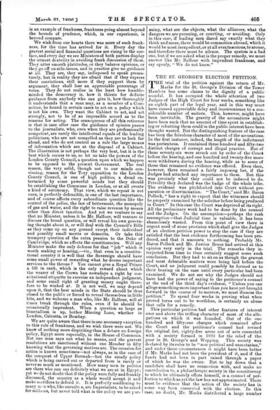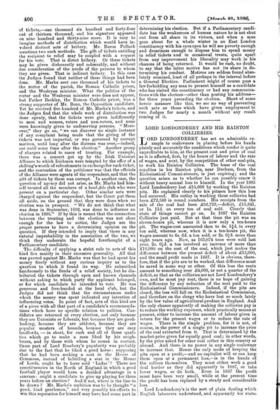THE ST. GEORGE'S ELECTION PETITION. T HE trial of the petition
against the return of Mr. Marks for the St. George's Division of the Tower Hamlets has some claims to the dignity of a public scandal. It has occupied the whole attention of two Judges of the High Court for four weeks, something like an eighth part of the legal year, and in this way must have caused appreciable delay and inconvenience to a con- siderable number of suitors. This, however, might have been inevitable. The gravity of the accusations might have been such that no amount of time spent in establish- ing or rebutting them could in the public interest have been thought wasted. But the distinguishing feature of the case has been the frivolous character of most of the accusations. In the first instance, indeed, the length of the indictment was portentous. It contained three hundred and fifty-two distinct charges of corrupt and illegal practice. But of these seventy-six were struck out by order of the Couit before the hearing, and one hundred and twenty-five more were withdrawn during the hearing, while as to some of those that remained no evidence was offered. Even then, however, there remained a fairly imposing list, if the Judges had attached any importance to them. But this was precisely what they could not be induced to do. Frivolity they declared was the badge of the whole tribe. The evidence was pitchforked into Court without pre- paration or discrimination. "The Court," said Mr. Baron Pollock, " has a right to expect that the witnesses should be properly examined by the solicitor before being produced in Court.' In this case the Court was deprived of its right. All the preliminary work had to be done by the counsel and the Judges. On the assumption—perhaps the rash assumption—that Judicial time is valuable, it has been shamelessly wasted. From this point of view there is urgent need of some provision which shall give the Judges of an election petition power to stop the case if they are satisfied that the best evidence forthcoming has been pro- duced, and that it amounts to nothing. Probably Mr. Baron Pollock and Mr. Justice Bruce had arrived at this opinion very early in the trial. The remarks they in- terjected from time to time certainly suggest some such conclusion. But they had to sit on as though the gravest and most debatable matters were being laid before the Court, and no judgment could possibly be formed as to their bearing on the case until every particular had been examined. We do not see why the Judges should not have had the power of saying to the petitioner's counsel at the end of the third day's evidence, "Unless you can allege something more important than you have yet brought forward in the course of to-morrow, we must dismiss the petition." To spend four weeks in proving what when proved turns out to be worthless, is certainly an abuse that calls for a remedy.
This particular petition had other features of interest over and above the trifling character of most of the alle- gations on which it was founded. Out of the one hundred and fifty-one charges which remained after the Court and the petitioner's counsel had revised the original list, eighty-five arose out of acts connected with a society formed in 1893 for the relief of the poor in St. George's and Wapping. This society was declared by its rules to be " non-political and unsectarian," and under these circumstances it might have been better if Mr. Marks had not been the president of it, and if the funds had not been in part raised through a paper of which he was the owner. But to lay down that a candidate shall have no connection with, and make no contribution to, a philanthropic society in the constituency to which be ultimately offers himself, is a counsel of per- fection to which as yet the law has not approximated. There must be evidence that the action of the society has in some way been connected with the election. In this case, no doubt, Mr. Marks distributed a large number of tickets,—one thousand six hundred and forty-four out of thirteen thousand, and his signature appeared on nine hundred and thirty-nine more. It is easy to imagine methods of distribution which would have in- volved distinct acts of bribery. Mr. Baron Pollock mentions two such methods. The gift of tickets entitling the recipient to relief may be coupled with a request for his vote. That is direct bribery. Or these tickets may be given dishonestly and colourably, and without due consideration of the needs of the persons to whom they are given. That is indirect bribery. In this case the Judges found that neither of these things had been done. Mr. Marks sent one thousand of his tickets to the rector of the parish, the Roman Catholic priest, and the Wesleyan minister. What the politics of the rector and the Wesleyan minister were does not appear, but Father Beckley, the Roman Catholic priest, was a strong supporter of Mr. Benn, the Opposition candidate. Yet he received five hundred of Mr. Marks's tickets, and the Judges find that the whole work of distribution was done openly, that the tickets were given indifferently to men and women, voters and non-voters, and none were knowingly given to undeserving persons. "More- over," they go on, "we can discover no single instance of any complaint being made that the giving of the tickets was not impartial, or was governed by corrupt motives, until long after the distress was over,—indeed, not until some time after the election." Another group of charges related to cases of treating. For example, there was a concert got up by the Irish Unionist Alliance to which Irishmen were tempted by the offer of a shilling's-worth of refreshments in exchangefor each ticket, and the contention of the petitioner was that the officials of the Alliance were agents of the respondent, and that the gift of tickets by them was corrupt. In another case, the question of agency did not arise, as Mr. Marks had him- self treated all the members of a bond-fide club who were present on a particular day. Other similar acts were charged against the respondent, but the Court put them all aside, on the ground that they were done when no election was in prospect. "We do not think that what was done in September, 1892, was done to influence an election in 1895." If by this is meant that the connection between the treating and the election was not close enough for the law to notice, the Judges are the proper persons to have a determining opinion on the question. If they intended to imply that there is any natural improbability in the association of the two, we think they underrate the hopeful forethought of a Parliamentary candidate.
The difficulty of applying a. strict rule to acts of this kind lies mainly in their excessive generality. All that was proved against Mr. Marks was that he had spent his money freely without any curious inquiry as to the quarters to which it found its way. He subscribed handsomely to the funds of a relief society, but he dis- tributed the tickets through open and known channels without asking to which party the applicant belonged, or for which candidate he intended to vote. He was generous and free-handed at the local club, but the Judges did not think that the circumstances under which the money was spent indicated any intention of influencing votes. In point of fact, acts of this kind are of a piece with all that part of a candidate's recommenda- tions which have no specific relation to politics. Can- didates are returned at every election, not only because they are Unionists or Liberals, but because they are good- looking, because they are athletes, because they are popular masters of hounds, because they are easy landlords, — in short, for each and all of those quali- ties which go to make a man liked by his neigh- bours, and by those with whom he comes in contact. Some part of Lord Rosebery's popularity was probably due to the fact that he liked a good horse : supposing that he had been seeking a seat in the House of Commons, instead of belittling a seat in the House of Lords, ought he to have sold ' Ladas ' ? There are constituencies in the North of England in which a good football player would have a decided advantage in a canvass : ought a candidate to give up playing for three years before an election ? And if not, where is the line to be drawn ? Mr. Marks's ambition was to be thought "a good, kind gentleman," and very possibly his efforts to win this reputation for himself may have had some part in determining his election. But if a Parliamentary candi- date has the weaknesses of human nature he is not shut out from all share in its virtues, and when a. man goes about for a whole winter in an East London constituency with his eyes open he will see poverty enough and dreariness enough to dispose him to spend money in relief tickets and in occasional treats, quite apart from any improvement his liberality may work in his chances of being returned. It would be rash, no doubt, to say that the latter motive has not its share in de- termining his conduct. Motives are seldom found abso- lutely unmixed, least of all perhaps in the interval before a General Election. Parliament might of course pass a law forbidding any man to present himself as a candidate who has visited the constituency or had any communica- tions with the electors—other than posting his address— for three years preceding the election. Short of some heroic measure like this, we see no way of preventing such acts as those which have given employment to two Judges for nearly a month without any result coming of it.







































 Previous page
Previous page